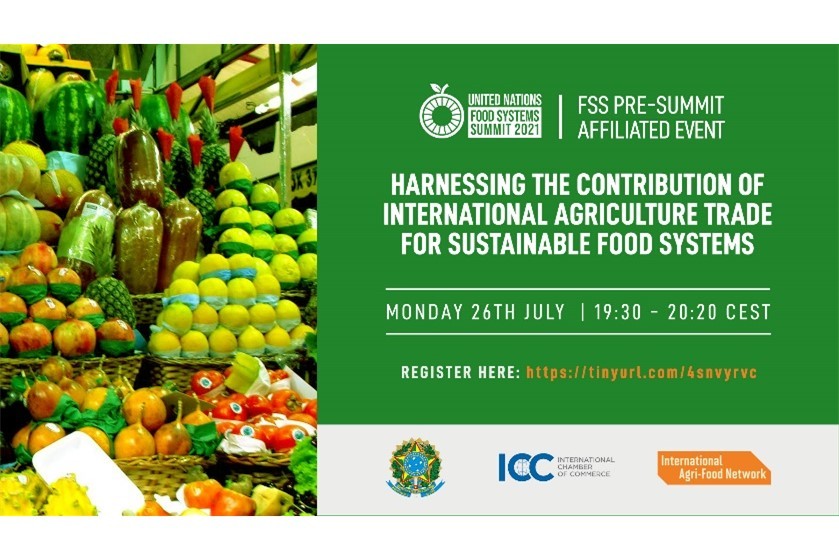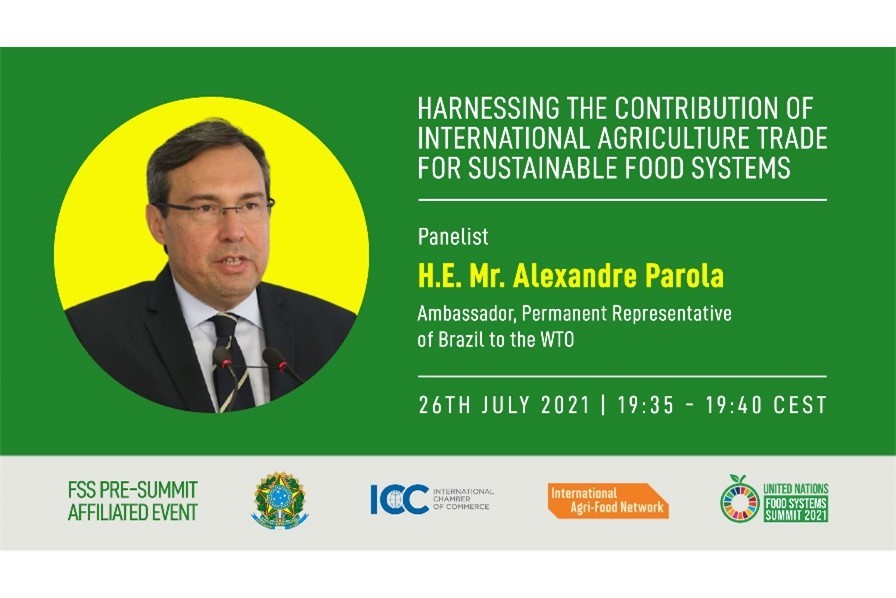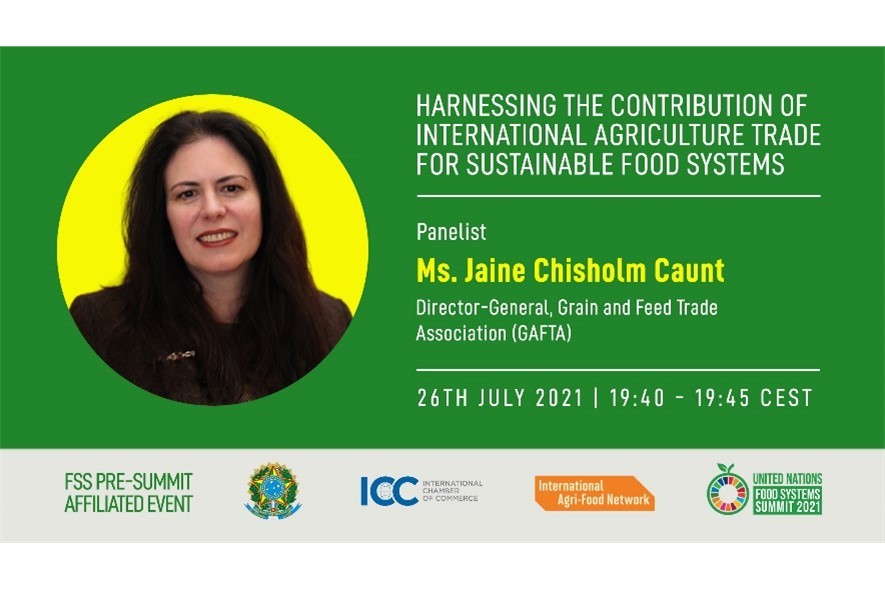World Milk Day 2024 Report – Celebrating Dairy’s Vital Role in Nutrition and Sustainability
This year, on June 1, we celebrated the vital role that dairy plays in delivering…
On July 6, the World Trade Organization Secretariat in collaboration with the United Nations Food Systems Summit organised a Global Summit Dialogue on Trade. During this event, WTO Director-General Ngozi Okonjo-Iweala highlighted the vital role trade plays in food security.
 In light of this, on July 26th at the United Nations Pre-Summit, the Government of Brazil and The International Agri-Food Network organised an Affiliated Session with the support of private sector members such as the International Chamber of Commerce and the International Grain Trade Coalition.
In light of this, on July 26th at the United Nations Pre-Summit, the Government of Brazil and The International Agri-Food Network organised an Affiliated Session with the support of private sector members such as the International Chamber of Commerce and the International Grain Trade Coalition.
The event entitled “Harnessing the Contribution of International Agricultural Trade for Sustainable Food Systems” took place virtually and discussions were led by a knowledgeable panel of speakers, including H.E. Mr Alexandre Parola, Permanent Representative of Brazil to the WTO, Ms Jaine Chisholm Caunt, Director-General, GAFTA, Dr Jared Greenville, a/g Executive Director, Australian Bureau of Agricultural and Resource Economics and Sciences, Ms Lynn Ng, Managing Director, ING Global Head Commodities Food & Agri.
Dr Maximo Torero, FAO Chief Economist, as moderator of the session opened the discussion by emphasizing the urgent need to support a transition to more efficient, inclusive, resilient agri-food systems to achieve a better balance in the economic, social, and environmental objectives as outlined in the SDGs.
 In the words of H.E. Parola, trade deserves to be one of the pillars of the Food Systems Summit. Many countries do not produce enough food from all the major food groups to ensure healthy and nutritious diets for all. He added that food security and trade are strongly intertwined. One in every 6 people globally depend entirely on imported food for the food they eat. This means that enhancing trade is key to an improved and sustainable food systems. COVID-19 is a peculiar challenge which has deteriorated the state of food security in the world so eliminating trade and market distortions instead of creating new trade barriers is a step in the right direction. According to the FAO, almost 10% of the global population suffered undernourishment due to the pandemic. Food security, food availability and sustainable food systems rely on the reform of agricultural trade rules. He expressed confidence in the efforts of the WTO to deliver better agricultural trade outcomes and declared Brazil was committed to fighting for the reform of agricultural trade rules to fulfil the mandate of the Agreement on Agriculture (AOA) and achieve SDG2 by correcting trade market distortions.
In the words of H.E. Parola, trade deserves to be one of the pillars of the Food Systems Summit. Many countries do not produce enough food from all the major food groups to ensure healthy and nutritious diets for all. He added that food security and trade are strongly intertwined. One in every 6 people globally depend entirely on imported food for the food they eat. This means that enhancing trade is key to an improved and sustainable food systems. COVID-19 is a peculiar challenge which has deteriorated the state of food security in the world so eliminating trade and market distortions instead of creating new trade barriers is a step in the right direction. According to the FAO, almost 10% of the global population suffered undernourishment due to the pandemic. Food security, food availability and sustainable food systems rely on the reform of agricultural trade rules. He expressed confidence in the efforts of the WTO to deliver better agricultural trade outcomes and declared Brazil was committed to fighting for the reform of agricultural trade rules to fulfil the mandate of the Agreement on Agriculture (AOA) and achieve SDG2 by correcting trade market distortions.
 Ms Jaine Caunt noted the importance in acknowledging the link between international trade and food security. International trade is vital to global food security as it is a vehicle to move food from countries with a surplus to those with a deficit. No country is entirely food sufficient. She called for greater collaboration on the elimination of trade barriers to agricultural products and pressed on the need to sharpen our focus on how to support free-flowing trade. Against the backdrop of climate change, the right crops need to be grown in environments where they can be cultivated efficiently, productively, and sustainably and then shipped to parts of the world where they are needed thereby reducing the need for land, input, energy, and other resources and this makes trade a critical driver. She concluded that sustainable agricultural development could improve livelihoods, lift people out of poverty, advance healthy nutrition, and improve political stability.
Ms Jaine Caunt noted the importance in acknowledging the link between international trade and food security. International trade is vital to global food security as it is a vehicle to move food from countries with a surplus to those with a deficit. No country is entirely food sufficient. She called for greater collaboration on the elimination of trade barriers to agricultural products and pressed on the need to sharpen our focus on how to support free-flowing trade. Against the backdrop of climate change, the right crops need to be grown in environments where they can be cultivated efficiently, productively, and sustainably and then shipped to parts of the world where they are needed thereby reducing the need for land, input, energy, and other resources and this makes trade a critical driver. She concluded that sustainable agricultural development could improve livelihoods, lift people out of poverty, advance healthy nutrition, and improve political stability.
Ms Lynn Ng expressed how trust and transparency are key ingredients to facilitating trade. She highlighted the need for a robust ecosystem for trade with internationally recognised standards for production. She added that we also need standards for the exchange of evidence that assures delivery of agricultural products by the supplier and payment by the recipient. The pandemic led to a greater acceptance of electronic documents, and this led to the timely delivery of food staples. This is a step in the right direction in her opinion, as is the digitalisation in trade.
Dr Greenville ended by stating that research has shown that not only are we producing food in the wrong locations, but we are also producing it less economically. In order to ensure better food security and a more sustainable food system, we need to have a robust trade ecosystem. A commitment to open markets has helped ensure constant supply even during a crisis such as COVID in countries like Australia.
The event reiterated that ensuring a trade supportive and least trade distortive environment allows consumers global access to food and feed and supports farmers’ ability to withstand external shocks and vulnerabilities. Since trade can have such a positive effect on our food systems, it is crucial that we strengthen international cooperation to harness this potential for sustainable food systems. We urge all stakeholders to share this message in the lead up to, and during the virtual UN Food Systems Summit set to take place on September 23, 2021. As part of the UN General Assembly High-Level week events, the summit will offer everyone everywhere a platform to make actionable commitments and work together to transform the way the world produces, consumes, and thinks about food.